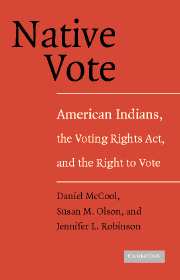2 - On Account of Race or Color
The Development of the Voting Rights Act
Published online by Cambridge University Press: 05 June 2012
Summary
The U.S. Congress passed the Voting Rights Act (VRA) of 1965 to complete the work started by the Fifteenth Amendment to the Constitution, ratified in 1870. The act has been amended and extended several times because of continuing discrimination against African Americans and other minorities. It is enforced through administrative action and the combined efforts of governmental and private litigation. This chapter reviews the evolution of the act and the various organizations that enforce it.
The Legislative and Judicial Evolution of the Voting Rights Act of 1965
With the end of Reconstruction in the South in 1877, formal and informal efforts to keep African Americans from voting quickly neutralized the political gains they had made. Poll taxes, literacy tests, all-white primary elections, and sheer intimidation were just a few of the many devices that kept African Americans from exercising their right to vote (Zelden 2002, 70–84; Valelly 2004). Even where they could vote, southern states reduced the votes' impact by turning elective offices into appointive ones, annexing new areas to bring in more white voters, moving to at-large elections where whites in the larger area outnumbered blacks, and making other changes. After twenty-five years and several lawsuits, the National Association for the Advancement of Colored People (NAACP) eventually succeeded in getting courts to eliminate the all-white primary, but facially race-neutral deterrents continued to permit discriminatory application.
- Type
- Chapter
- Information
- Native VoteAmerican Indians, the Voting Rights Act, and the Right to Vote, pp. 21 - 44Publisher: Cambridge University PressPrint publication year: 2007



